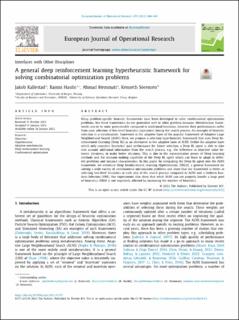| dc.contributor.author | Kallestad, Jakob Vigerust | |
| dc.contributor.author | Hasibi, Ramin | |
| dc.contributor.author | Hemmati, Ahmad | |
| dc.contributor.author | Sörensen, Kenneth | |
| dc.date.accessioned | 2023-05-25T08:56:56Z | |
| dc.date.available | 2023-05-25T08:56:56Z | |
| dc.date.created | 2023-01-30T10:47:56Z | |
| dc.date.issued | 2023 | |
| dc.identifier.issn | 0377-2217 | |
| dc.identifier.uri | https://hdl.handle.net/11250/3068956 | |
| dc.description.abstract | Many problem-specific heuristic frameworks have been developed to solve combinatorial optimization problems, but these frameworks do not generalize well to other problem domains. Metaheuristic frameworks aim to be more generalizable compared to traditional heuristics, however their performances suffer from poor selection of low-level heuristics (operators) during the search process. An example of heuristic selection in a metaheuristic framework is the adaptive layer of the popular framework of Adaptive Large Neighborhood Search (ALNS). Here, we propose a selection hyperheuristic framework that uses Deep Reinforcement Learning (Deep RL) as an alternative to the adaptive layer of ALNS. Unlike the adaptive layer which only considers heuristics’ past performance for future selection, a Deep RL agent is able to take into account additional information from the search process, e.g., the difference in objective value between iterations, to make better decisions. This is due to the representation power of Deep Learning methods and the decision making capability of the Deep RL agent which can learn to adapt to different problems and instance characteristics. In this paper, by integrating the Deep RL agent into the ALNS framework, we introduce Deep Reinforcement Learning Hyperheuristic (DRLH), a general framework for solving a wide variety of combinatorial optimization problems and show that our framework is better at selecting low-level heuristics at each step of the search process compared to ALNS and a Uniform Random Selection (URS). Our experiments also show that while ALNS can not properly handle a large pool of heuristics, DRLH is not negatively affected by increasing the number of heuristics. | en_US |
| dc.language.iso | eng | en_US |
| dc.publisher | Elsevier | en_US |
| dc.rights | Navngivelse 4.0 Internasjonal | * |
| dc.rights.uri | http://creativecommons.org/licenses/by/4.0/deed.no | * |
| dc.title | A general deep reinforcement learning hyperheuristic framework for solving combinatorial optimization problems | en_US |
| dc.type | Journal article | en_US |
| dc.type | Peer reviewed | en_US |
| dc.description.version | publishedVersion | en_US |
| dc.rights.holder | Copyright 2023 the authors | en_US |
| cristin.ispublished | true | |
| cristin.fulltext | original | |
| cristin.qualitycode | 2 | |
| dc.identifier.doi | 10.1016/j.ejor.2023.01.017 | |
| dc.identifier.cristin | 2118066 | |
| dc.source.journal | European Journal of Operational Research | en_US |
| dc.source.pagenumber | 446-468 | en_US |
| dc.identifier.citation | European Journal of Operational Research. 2023, 309 (1), 446-468. | en_US |
| dc.source.volume | 309 | en_US |
| dc.source.issue | 1 | en_US |

